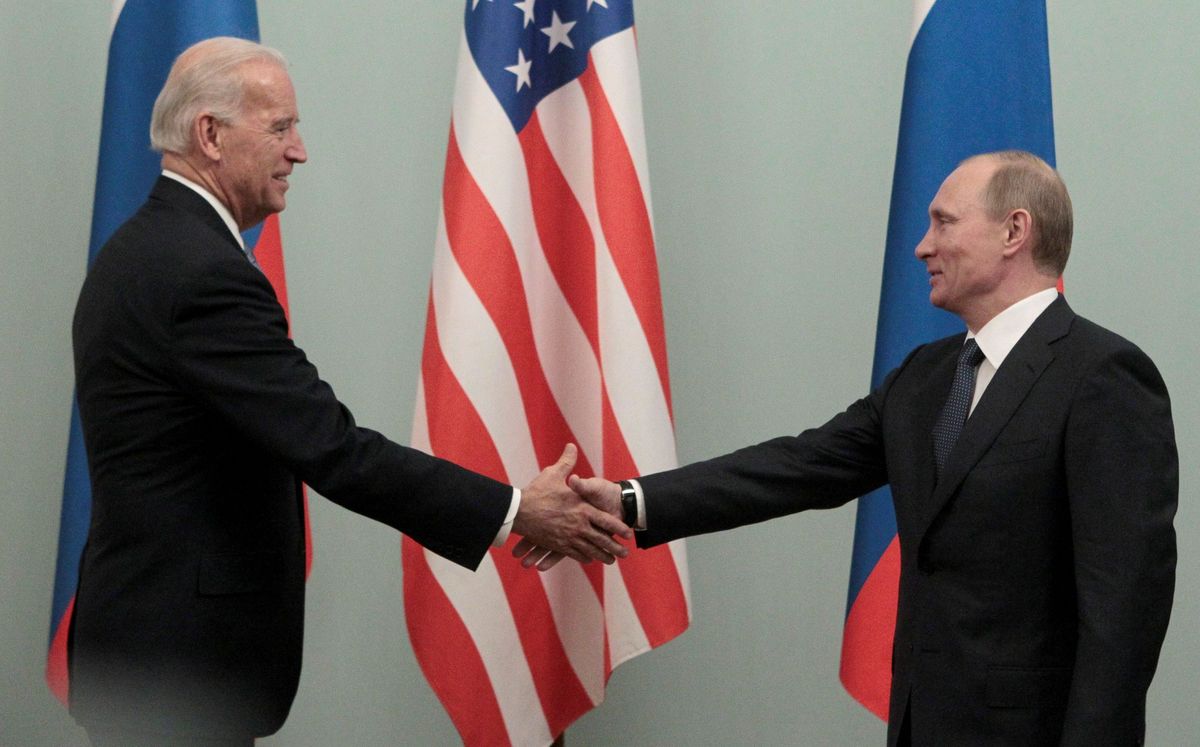Biden’s relationship with Putin, explained

A few minutes every morning is all you need.
Stay up to date on the world's Headlines and Human Stories. It's fun, it's factual, it's fluff-free.
The administration has recently announced plans to implement a series of sanctions targeting the Russian economy, including six Russian companies that run cyberhacking operations for the Russian government.
When he was vice president, Joe Biden spent a lot of time talking to Russian President Vladimir Putin. Now as president, Biden is focusing his attention on parts of the United States’ foreign policy that he believes to be too lenient on Russia. With recently announced sanctions, the Biden administration intends to send a strong message to the Kremlin.
Biden’s history with Putin
In 2009, while serving as vice president under the Obama administration, Biden gave a speech at the Munich Conference on Security Policy announcing a “new tone” in international diplomacy.
“It’s time to press the reset button and to revisit the many areas where we can and should be working together with Russia,” Biden stated. The vice president then called for the two countries to collaborate in an effort to reduce the number of nuclear weapons each country had stockpiled and to join together to fight international threats from extremist groups like the Taliban and Al Qaeda.
Though Putin was prime minister in 2009 due to Russia’s constitution not allowing a president to hold more than two consecutive terms – a law that has since been amended – it was nevertheless apparent at the time that Putin still held the most power in the country.
In 2014, Russia invaded Ukraine and claimed Crimea. At the time of the invasion, Putin told members of Russia’s parliament, among others, that the US had “cheated us again and again, made decisions behind our back, presenting us with completed facts.”
Putin continued, saying, “That’s the way it was with the expansion of NATO in the East, with the deployment of military infrastructure at our borders.”
Biden pressed President Barack Obama to respond by offering military aid to Ukraine, stating that Russia needed to “pay in blood and money.”
While Obama ultimately ignored Biden’s request, the vice president appeared in Ukraine a number of times and spent countless hours on the phone advising the country’s leaders. The ties Biden formed in Ukraine during this time eventually led his opponents to allege corruption on Biden’s part, an attack the Trump campaign used repeatedly during the 2020 presidential campaign.
Biden’s stance on Putin and Russia sharpened further when he left office in January 2017. Later that year, Biden co-authored a piece in Foreign Affairs Magazine titled “How to Stand Up to the Kremlin” where he described Putin’s “assault on democracy” and America’s need to fight back.
Where things stand
In early March, the Biden administration released previously classified intelligence stating that Russia’s Federal Security Service (the Federal’naya Sluzhba Bezopasnosti, more commonly known as the FSB) was responsible for poisoning opposition leader Aleksei Navalny. The administration also announced sanctions in response to Russia’s attempted assassination of Navalny – which the Russian government has denied – and Navalny’s subsequent imprisonment.
When asked by George Stephanopoulos during an ABC News interview whether he thought Putin was a killer, Biden said that he did.
Russia recalled its ambassador, Anatoly I. Antonov, from Washington in response to Biden’s comments, with Russia’s Foreign Ministry stating that the measure was needed “in order to analyze what needs to be done in the context of relations with the United States.”
Responding to Biden, Putin stated that “When I was a child, when we argued in the courtyard, we said the following: ‘If you call someone names, that’s really your name,’” adding, “When we characterize other people, or even when we characterize other states, other people, it is always as though we are looking in the mirror.”
The administration has recently announced plans to implement a series of stronger sanctions targeting the Russian economy. The sanctions also target six Russian companies that run cyberhacking operations for the Russian government.
These measures, Biden explained, are a response to Russian meddling in the 2020 election and a cyberattack that breached email systems at the Treasury and Commerce Departments in December 2020.
“I chose to be proportionate,” Biden said at the White House. “We want a stable, predictable relationship.”
Stable and predictable, though, may be difficult as Russia has already stated that it intends to retaliate.
However, the two leaders did speak by phone on Tuesday, April 13. Biden has attempted to de-escalate tensions between the two, saying he was looking forward to a potential summit this summer.
“The way forward is through thoughtful dialogue,” Biden added.
Have a tip or story? Get in touch with our reporters at tips@themilsource.com




Comments ()